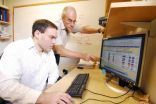(Press-News.org) In the early years of the AIDS epidemic, being infected with the virus that causes the disease was considered a virtual death sentence. But with the development of antiretroviral therapy, many with HIV are now living much longer. In fact, it is estimated that by 2015, about half of all HIV-positive individuals will be older than 50.
Yet those over 50 also progress to AIDS faster than adults in their 20s or 30s. And those in the younger age bracket — even those responding well to antiretroviral therapy — still exhibit illnesses and clinical conditions commonly associated with older people, such as certain cancers and liver diseases. For the most part, the reasons for this have remained a mystery.
But a UCLA AIDS Institute study published Jan. 26 in the online journal PLoS ONE suggests a partial explanation, showing that HIV causes a specific subset of CD4+ "helper" T-cells — which play an important role in the body's response to infection — to age rapidly, by as much as 20 to 30 years over a three-year period.
In the study, researchers witnessed a decline in CD4+ T-cell numbers and, most strikingly, found that in the surviving T-cells, the HIV virus caused rapid and drastic shortening of the ends of chromosomes, called telomeres, which protect the chromosomes and prevent them from fusing together, much like plastic tips keep shoelaces from unraveling. Telomeres become progressively shorter during natural cell division; when they become too short, cells do not function properly.
"Our findings have important implications for the health of both young and old HIV-1–infected adults," said lead investigator Tammy M. Rickabaugh, an assistant research immunologist in the division of hematology and oncology at the David Geffen School of Medicine at UCLA. "They underscore the importance of developing new approaches to boost immune function to complement current treatments, which are exclusively directed against the virus."
The researchers examined two subsets of CD4+ T-cells (CD45RA+ CD31+ and CD45RA+ CD31-) in two groups of individuals — those aged 20 and those aged 39 — who had been infected with HIV for one to three years and who had not been treated with antiretroviral therapy. They compared these two groups with samples from age-matched controls who were HIV seronegative.
The researchers specifically focused on "naive" T-cells — those that had not previously encountered any pathogens and thus act as a reserve against future infections and cancers. They found that in individuals infected with HIV-1, these cells underwent unexpectedly rapid aging — the equivalent of 20 to 30 years of aging within three years of infection. They also found that the number of CD31- T-cells, which are more quickly pulled into the fight against new pathogens, had fallen drastically.
The researchers also investigated whether appropriate treatment could reverse this aging effect. They examined cells from HIV-positive individuals who had been on antiretroviral therapy for two years and whose therapy had successfully kept HIV-1 under control. They found that while the therapy kept their viral loads at undetectable levels, it did not entirely restore their immune systems, suggesting a reason why younger HIV-positive people still become ill with conditions more common to older people.
"Taken together, our results help to explain some of the clinical observations that have been documented in HIV-infected people and emphasize the need for developing therapeutic approaches directed at improving the naive immune cell compartment," said senior investigator Beth D. Jamieson, an associate professor of medicine in the division of hematology and oncology at the David Geffen School of Medicine at UCLA. "This is critically important in light of the demographic shift of HIV-infected persons."
INFORMATION:
Grants from the National Institute of Allergy and Infectious Diseases; the National Institute on Aging; the National Cancer Institute; the National Heart, Lung and Blood Institute; UCLA's Jonsson Comprehensive Cancer Center; the UCLA AIDS Institute; and the David Geffen School of Medicine at UCLA funded this study.
Additional researchers included Ryan D. Kilpatrick, Lance E. Hultin, Patricia M. Hultin, Mary Ann Hausner, Catherine A. Sugar, Roger Detels and Rita B. Effros of UCLA; Keri N. Althoff and Joseph B. Margolick of Johns Hopkins University; Charles R. Rinaldo of the University of Pittsburgh; and John Phair of Northwestern University.
The UCLA AIDS Institute, established in 1992, is a multidisciplinary think tank drawing on the skills of top-flight researchers in the worldwide fight against HIV and AIDS, the first cases of which were reported in 1981 by UCLA physicians. Institute members include researchers in virology and immunology, genetics, cancer, neurology, ophthalmology, epidemiology, social sciences, public health, nursing and disease prevention. Their findings have led to advances in treating HIV, as well as other diseases, such as hepatitis B and C, influenza and cancer.
For more news, visit the UCLA Newsroom and follow us on Twitter.
Research suggests HIV causes rapid aging in key infection-fighting cells
2011-01-28
ELSE PRESS RELEASES FROM THIS DATE:
Study suggests new treatment option to reduce metastasis in ovarian cancer
2011-01-28
A paper published in the January issue of the journal Nanomedicine could provide the foundation for a new ovarian cancer treatment option – one that would use an outside-the-body filtration device to remove a large portion of the free-floating cancer cells that often create secondary tumors.
Researchers at the Georgia Institute of Technology have formed a startup company and are working with a medical device firm to design a prototype treatment system that would use magnetic nanoparticles engineered to capture cancer cells. Added to fluids removed from a patient's abdomen, ...
LSU's Mark Batzer decodes orangutan genome
2011-01-28
BATON ROUGE – The word "orangutan" is derived from a Malay phrase meaning "man of the forest," which is a perfectly apt description of these tree-dwelling primates. Genetically the most distant great ape from humans, these critically endangered creatures inhabit the jungles of Borneo and Sumatra. As an arboreal species, they are incredibly sensitive to deforestation, which has decimated census populations in recent years. Mark Batzer, LSU System Boyd Professor and Dr. Mary Lou Applewhite Distinguished Professor of Biological Sciences, and an international consortium of ...
Secondhand smoke laws may reduce childhood ear infections
2011-01-28
Boston, MA -- Harvard School of Public Health (HSPH) researchers and colleagues from Research Institute for a Tobacco Free Society have found that a reduction in secondhand smoking in American homes was associated with fewer cases of otitis media, the scientific name for middle ear infection. The study appears on January 26, 2011, as an online first article on the website of the journal Tobacco Control.
"Our study is the first to demonstrate the public health benefits to children of the increase in smoke-free homes across the nation. It also is the first study to quantify ...
Study: Diabetes affects patients' well-being and also impacts spouses
2011-01-28
WEST LAFAYETTE, Ind. - Older patients with diabetes who are not dealing well with the disease are likely to have symptoms of depression, and spouses of older patients also suffer distress related to diabetes and its management, according to research from Purdue University.
"Responsibilities and anxieties can differ for patients with diabetes and their spouses, but each may experience stress, frustration and sadness at times related to the demands of living with this disease," said Melissa M. Franks, an assistant professor of child development and family studies. "We know ...
Celiac disease and Crohn's disease share part of their genetic background
2011-01-28
An investigation has found that celiac disease and Crohn's disease, both inflammatory diseases of the gastrointestinal tract, share at least four genetic risk loci. Together, researchers from the University of Groningen, The Netherlands; the Broad Institute, USA; the Université de Montréal and Montreal Heart Institute in Canada performed a combined meta-analysis of genome-wide data for celiac disease and Crohn's disease. This meta-analysis, published in the open-access journal PLoS Genetics on January 27, has identified two new shared risk loci and two shared risk loci ...
New findings show how bacteria undergo genome evolution
2011-01-28
Scientists at the Institut Pasteur and the University of Maryland have revealed how bacterial and archaea microbes successfully evolve their gene repertoires to face new challenges, predominantly by acquiring genes from other individuals. The study, published in the open-access journal PLoS Genetics on January 27, was instigated to clarify the role of gene duplication, an important source of novelty in multicellular organisms, in bacteria.
Microbes live and thrive in incredibly diverse and harsh conditions, from boiling or freezing water to the human immune system. This ...
Gene 'relocation' key to most evolutionary change in bacteria
2011-01-28
COLLEGE PARK, Md. – In a new study, scientists at the University of Maryland and the Institut Pasteur show that bacteria evolve new abilities, such as antibiotic resistance, predominantly by acquiring genes from other bacteria.
The researchers new insights into the evolution of bacteria partly contradict the widely accepted theory that new biological functions in bacteria and other microbes arise primarily through the process of gene duplication within the same organism. Their just released study will be published in the open-access journal PLoS Genetics on January ...
Modern humans reached Arabia earlier than thought, new artifacts suggest
2011-01-28
Artifacts unearthed in the United Arab Emirates date back 100,000 years and imply that modern humans first left Africa much earlier than researchers had expected, a new study reports. In light of their excavation, an international team of researchers led by Hans-Peter Uerpmann from Eberhard Karls University in Tübingen, Germany suggests that humans could have arrived on the Arabian Peninsula as early as 125,000 years ago — directly from Africa rather than via the Nile Valley or the Near East, as researchers have suggested in the past.
The timing and dispersal of modern ...
How now, inside the cow: Nearly 30,000 novel enzymes for biofuel production improvements
2011-01-28
VIDEO:
The DOE Joint Genome Institute is characterizing plants, microbes and communities of microbes to improve the production of next generation biofuels.
Click here for more information.
WALNUT CREEK, Calif.—Cows eat grass—this has been observed for eons. From this fibrous diet consisting mainly of the tough to degrade plant cell wall materials cellulose and hemicellulose, substances of no nutritional value to most animals, ruminants manage to extract all they need ...
Infants ascribe social dominance to larger individuals
2011-01-28
CAMBRIDGE, Mass. -- Psychologists at Harvard University have found that infants less than one year old understand social dominance and use relative size to predict who will prevail when two individuals' goals conflict. The finding is presented this week in the journal Science.
Lead author Lotte Thomsen says the work suggests we may be born with -- or develop at a very early age -- some understanding of social dominance and how it relates to relative size, a correlation ubiquitous across human cultures and the animal kingdom. This knowledge may help infants face the formidable ...



